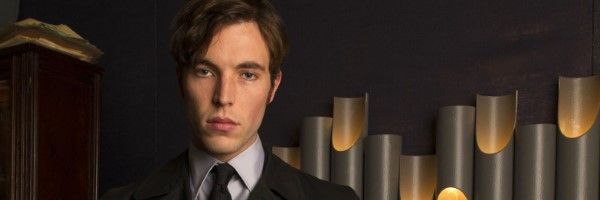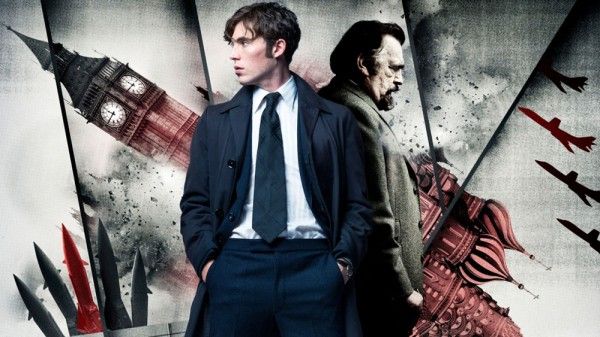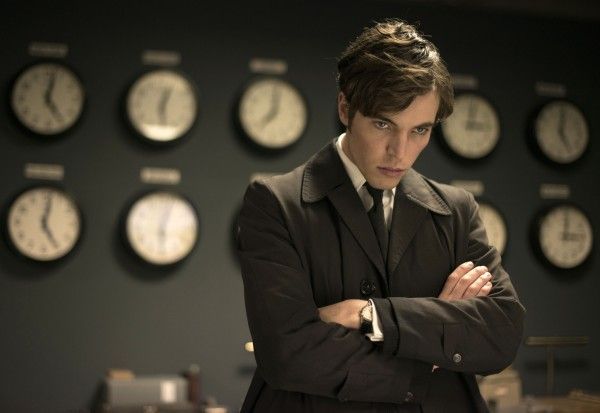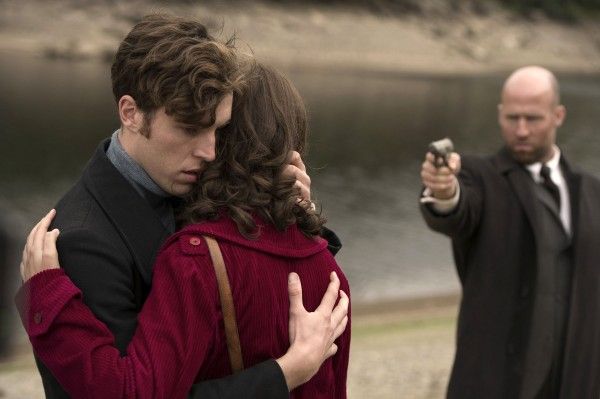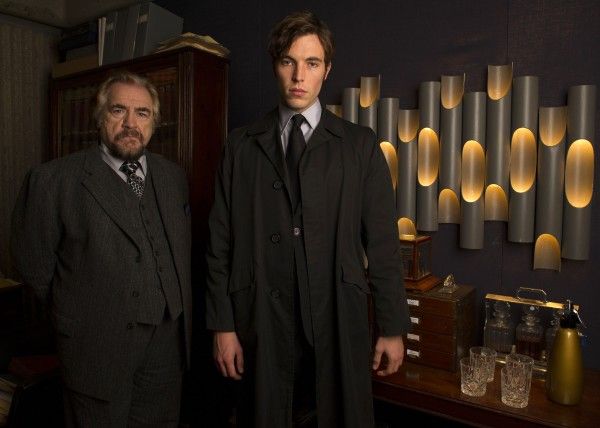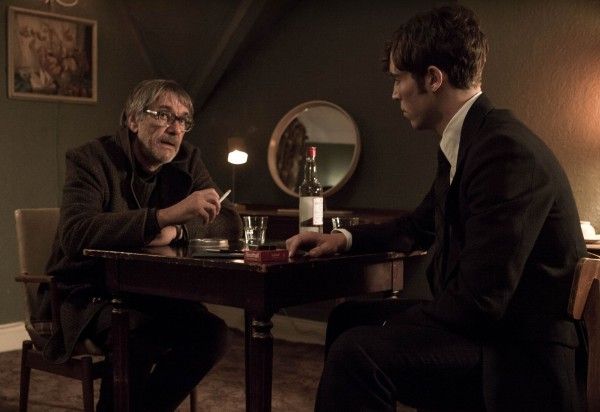The drama series The Game is about a complex invisible war being fought by skilled spies who are trained in the high stakes world of covert espionage. In 1972 London, a dangerous and deadly Soviet plot has been designed to bring Britain to its knees, and MI5 agent and undercover expert Joe Lambe (Tom Hughes) must track down Soviet sleeper agents, one by one, before they carry out their plan. Created by Toby Whithouse (Being Human), the six-part thriller also stars Brian Cox, Paul Ritter, Victoria Hamilton, Jonathan Aris, Shaun Dooley, Chloe Pirrie, Marcel Iuers, Jevgenij Sitochin and Zana Marjanovic.
During this exclusive interview with Collider, executive producer Toby Whithouse talked about how the idea for this show came about, how much research he did to make this feel accurate, writing characters that are implying and suggesting instead of stating, that this story demands attention, how amazing it was to see this cast bring these characters to life, and how he already knows where Season 2 will go, while actor Tom Hughes talked about what most appealed to him about this project, why he’s been waiting for a role like this, what he loved about the story structure, and how much fun he had working with Brian Cox. Check out what they had to say after the jump.
Collider: Toby, particularly recently, you’ve become known for your genre work, with Being Human and Doctor Who. How did this show come about?
TOBY WHITHOUSE: Without getting too wanky and mystical about it, you don’t tend to choose the ideas that you have. I would say that my first love has always been genre stuff, with sci-fi and horror, but the idea for this show just came along. And ideas come and go. It’s about whether or not they take root, and this one really took root. I do think there’s a consistency of tone, from Being Human to The Game. Weirdly, there’s also a similarity of dynamic. In both shows, you have this tiny, close-knit group of people, working in secret to preserve peace in the world order. I like the notion of working in anonymity. But the idea came along when my brother suggested I read The Spy Who Came in From the Cold, and I thought it was absolutely fantastic. It was right around the time that the Tinker Tailor film came out. There was just something about that era and the Cold War that I thought, “Somebody should do a show about this.” And then, I genuinely thought, “Well, I could do it.” And at the same time, I was asked to pitch an idea for a BBC one series, and I started talking about this. For some reason, that idea had taken root, and I developed it from there.
When you do something like this, do you feel like you have to do a lot of research to get as accurate as possible?
WHITHOUSE: Yes. I wanted to set it in the ‘70s, primarily because it was a very lo-fi era. If you look at espionage shows now, there’s facial recognition, GPS phone tracking, and stuff like that. From a writer’s point of view, those things actually short-cut drama. It makes stories sometimes play out too easily. I like the obstructions and limitations of a lo-fi world. So, consequently, I did research into the secret service. We had a technical advisor, who’s a former MI6 officer and had some very interesting stories to tell us. I did a lot of research about the political crime, at the time. From a modern-day, 2014 point of view, it was very easy to forget the fact that, in the 1970s, there was a very, very genuine fear of Soviet invasion, in a way that we find difficult to comprehend now. It was a very volatile, paranoid era, which seemed completely appropriate for the show, so I did a lot of research into that. With the secret service, they’re not particularly open about the techniques and objectives, so I had to rely on a fair degree of invention, mainly just because they would neither confirm nor deny whether I got it right or not.
TOM HUGHES: The thing that that I found most appealing was the character of Joe. I’m still in my 20s, and when you’re in your early 20s, a lot of characters can be one or two dimensional. You want a role to substantiate the drama, as opposed to actually analyzing the psychology of a human being. That’s what drew me to acting, particularly the contradictions in people. And Joe is such a contradiction. There is so much unsaid. There is so much that he’s guarded, locked away, and is hiding. Rather than exposing a weakness in him, he has this enigma that draws people in. It’s something I think he worked on, his entire life. It was that challenge of making a character that seems to give nothing away, have this depth of emotion going on, behind this cold, stoic, analytical front. I thought that was an amazing challenge. I’ve been really patiently waiting for a part like this. You often get it with the bad boys. When I was in my mid-20s, those were the parts that had that contradiction. I wanted to find a part where I could explore that, and it could still have that complexity. So, the part was a dream for me, and I was desperate to get it. And then, the political climate was such that the stakes were quite high for everyone, in every class. It was interesting to discover and find out about a character that had that complexity within him, at a time that was complex and in a world that I knew nothing about. It’s complex, in the fact that it’s so secretive. Every element went together to make it something I was just desperate to play.
Was it hard to find a character that could live up to the work you did in Dancing on the Edge?
HUGHES: Both characters are similar, in the sense that both characters are trying to escape themselves through what has happened in their childhood. Our childhood shapes us. If you talk to any psychologist, the first thing they ask is, “What happened in your childhood?” The beauty of Dancing on the Edge, for me, was Stephen Poliakoff’s writing. That was an incredible part who, on the surface, was just a young, affable aristocrat, and underneath had all this darkness consuming him. That’s very similar to Joe. They’re completely polar opposites in how that manifests, but their contradiction is similar because it’s actually universal. Everyone has things that are holding them back, or that they can’t quite accept about themselves. Those are always the parts that fascinate me. What fascinates me in life is when people don’t say what they really feel. In drama, because things are heightened, you can actually focus on the points of life that we usually skirt around because they’re too scary to deal with.
In American drama, there’s a tendency to over-explain everything, which doesn’t happen in British drama.
WHITHOUSE: I think that’s the British character. I wouldn’t say that we’re reserved, but we’re probably repressed. Also, that period was before analysis became very popular, so people did tend to deal with everything on their own. It’s the post-war generation of just making due and getting on. That’s certainly something that I wanted in the character. From a writer’s point of view, to write characters that are implying, as opposed to saying, and suggesting, as opposed to stating, is more of a challenge, but much more fun.
HUGHES: It’s much more fun as an actor, as well. If everything is on the page and you’re spoon-feeding an audience you feel like your job is merely to say the words clearly because the structure of the story will take care of itself. What I love about Toby’s writing is that the structure is such that it is there and it is solid and it will carry the story. The secrets that the characters hold are held back from the audience, and that’s such a delight to hold onto. When you’re playing scenes, it gives you an inner dialogue that allows you to really immerse yourself as the actor, in every scene that you’re playing. Nothing felt expositional. Nothing felt like we were just doing it to move the story along. There was a reason these characters were saying what they’re saying. It was a gift, really.
Do you feel like the way this story immerses the audience will make them want to pay closer attention to what’s going on?
WHITHOUSE: I would hope that The Game demands attention. It’s an incredibly labyrinthine plot, to the point where myself and the other executive producers would go, “Okay, he knows that, but suspects this.” Consequently, it was like a three-dimensional game of Sudoku. You can’t have this piece of information come out there, because it contradicts this piece of information here. I had to hold myself and the scripts for all six episodes to that story. We would have these long story writing meetings and come out just completely brain frozen, but that was what I wanted to do. I wanted something that was labyrinthine and complex and made demands on the audience. Often, the intelligence of the audience is under-estimated. As a result, when you look at the shows that do well, and you look at something like True Detective, they make demands of the audience, and audiences love that. They love the sense of inclusion that that gives.
Tom, what was it like to work with Brian Cox, especially with the dynamic your characters have?
HUGHES: It was unbelievably fun. Brian is a great bloke. The whole cast, to be honest, was great. Every single person was great, but unbelievably focused on doing a good job without feeling like it was unnecessarily hard work. There was a collective feeling of unity. It is very much an ensemble cast. You spend more time with certain characters, but every single cog within the machine is necessary, both to the story and to the investigation that is taking place. It felt like a collaborative effort. And Brian is a phenomenal actor, and a kind, generous man. So, for me to work with him in such close proximity, I couldn’t help but learn. I’m still relatively new to all of this, so I still feel like I’m a bit of a sponge. Any help I can get is brilliant. Just to work with him in such close proximity was fantastic. I really enjoyed it.
Is it a bit surreal to call Brian Cox “Daddy,” even if it’s his character’s name?
WHITHOUSE: The thing about the character is that I wanted him to be somebody who is completely consumed by his job, in a way that the job has eaten him. It’s eaten his entire identity, even his name. In my version of MI5, “Daddy” is the name that’s given to the Director General, in the same way that the head of MI6 was called “C.” In the James Bond films it’s “M.” The name that they are called is their rank, essentially. It’s their position and their job, as opposed to them.
Toby, with an ensemble of such interesting characters, what was it like to see this cast bring them to life?
Will we feel a sense of completion of the story, at the end, or will there still be questions?
WHITHOUSE: Like any war, the Cold War lasted for decades. This is just a little moment within that war. And then, Season 2 and onwards, there are ramifications of the Season 1 story. There will be the next adventure, or the next chapter. But hopefully, there is a sense of completion, at the end of the first six. I’ve storylined Season 2 and written the first episode. It wasn’t all a dream. The story goes on.
The Game airs on Wednesday nights on BBC America.

